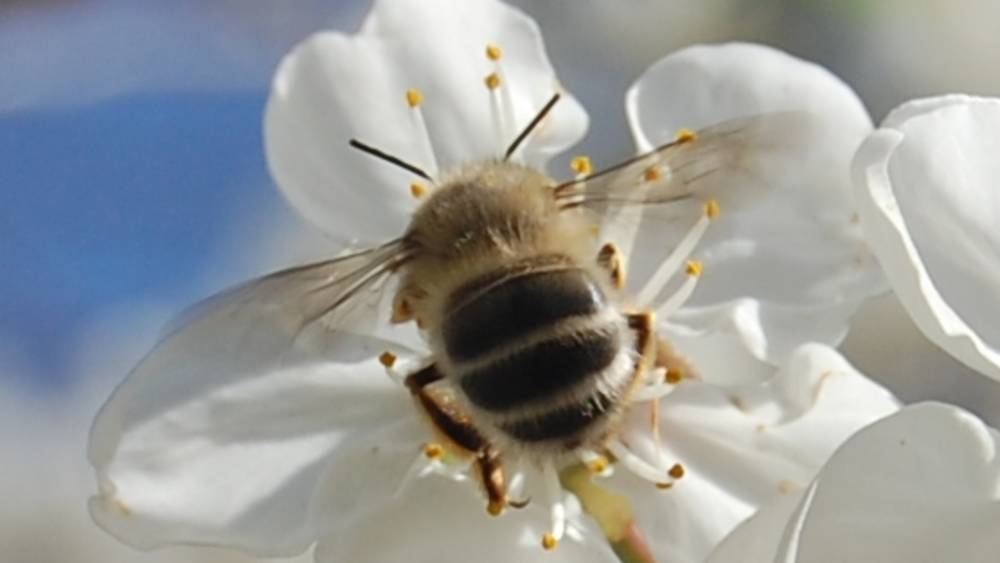14 August 2019. A film by Mabel Gundlach for Deutsche Welle. Scientists and farmers in northern Morocco are measuring the number of remaining insects. Populations of butterflies, wild bees and flies have fallen, which could have a dramatic impact on food production.
Populations of butterflies, wild bees and flies have fallen in many countries globally, which could have a dramatic impact on food production, ecosystems, climate change resilience, human wellbeing and future peace.
Bees, butterflies and other pollinators are threatened around the world. An ICARDA-project introducing the Farming with Alternative Pollinators (FAP) approach is encouraging farmers in Morocco to use marketable pollinator attracting plants like oil seeds, spices or more diverse food crops around the fields or within strips and insect hotels to protect them. Different to reward-based wildflower strips in Europe and America, pollinator protection by FAP includes support for nesting. FAP also builds on enhancing the knowledge and skills of farmers and measuring the impacts caused by the habitat enhancement on insect diversity (pollinators, natural enemies and pests) and income.
Trials in Uzbekistan and Morocco show high income gain per surface and high reduction of pests, so FAP also reduces the need for chemicals. ICARDA works on reducing chemicals with other methods already for decades. FAP includes also a cross-sector policy mix, affordable also for Low Income Countries. Morocco already joined the Coalition of the Willing on Pollinators in May 2019 and works on a national pollinator protection strategy. The project coordinator, Dr. Stefanie Christmann presented FAP and first project results during COP CBD 2018 in Sham El Sheikh.
Populations of butterflies, wild bees and flies have fallen in many countries globally, which could have a dramatic impact on food production, ecosystems, climate change resilience, human wellbeing and future peace.
Bees, butterflies and other pollinators are threatened around the world. An ICARDA-project introducing the Farming with Alternative Pollinators (FAP) approach is encouraging farmers in Morocco to use marketable pollinator attracting plants like oil seeds, spices or more diverse food crops around the fields or within strips and insect hotels to protect them. Different to reward-based wildflower strips in Europe and America, pollinator protection by FAP includes support for nesting. FAP also builds on enhancing the knowledge and skills of farmers and measuring the impacts caused by the habitat enhancement on insect diversity (pollinators, natural enemies and pests) and income.
Trials in Uzbekistan and Morocco show high income gain per surface and high reduction of pests, so FAP also reduces the need for chemicals. ICARDA works on reducing chemicals with other methods already for decades. FAP includes also a cross-sector policy mix, affordable also for Low Income Countries. Morocco already joined the Coalition of the Willing on Pollinators in May 2019 and works on a national pollinator protection strategy. The project coordinator, Dr. Stefanie Christmann presented FAP and first project results during COP CBD 2018 in Sham El Sheikh.
Background:
- Project goal: Protecting pollinators
- Project duration: June 2017 to May 2022
- Donor: The German Federal Minister for the Environment, Nature Conservation, and Nuclear Safety, International Center for Agricultural Research in the Dry Areas (ICARDA)
- Budget: €6,583,079 ($7,361,758) within the framework of the International Climate Initiative.The funding covers seven countries, including Morocco. Project partners in Morocco: INRA and ONCA. Outscaling FAP-projects in Algeria, Tunisia, Egypt, Palestine, Jordan and Turkey will start in 2020
Bees, butterflies and flies play an essential role in pollinating plants. Without them, humans would have a hard time finding food. Some 75 percent of our most-cultivated crops depend on insect pollination. 87% of all flowering plants need pollinators, we would lose them and their ecosystem services in case of pollinator loss. Cross-pollination also enriches the genetic diversity of plants, which in turn helps them adapt to climate change.
But around the world, pollinators are under threat.[1]
[1] Potts SG, Imperatriz-Fonseca V, Ngo HT, Aizen MA, Biesmeijer JC, Breeze TD, et al. (2016a) Safeguarding Pollinators and their values to human well-being. Nature 540:220–229
The Intergovernmental Science-Policy Platform on Biodiversity and Ecosystem Services (IPBES) report, approved by more than 130 countries, recognizes the fundamental importance of conserving agricultural diversity for human and environmental well-being
[1] Potts SG, Imperatriz-Fonseca V, Ngo HT, Aizen MA, Biesmeijer JC, Breeze TD, et al. (2016a) Safeguarding Pollinators and their values to human well-being. Nature 540:220–229
The Intergovernmental Science-Policy Platform on Biodiversity and Ecosystem Services (IPBES) report, approved by more than 130 countries, recognizes the fundamental importance of conserving agricultural diversity for human and environmental well-being
The Intergovernmental Science-Policy Platform on Biodiversity and Ecosystem Services (IPBES) report, approved by more than 130 countries, recognizes the fundamental importance of conserving agricultural diversity for human and environmental well-being
Further references:
- Video: Morocco: Recognizing the importance of insects
- Conservation of pollinator diversity for enhanced climate change resilience
- Video in German: Marokko: Forschung gegen das Insektensterben | Global Ideas
- Video in Spanish 13/08 Marruecos: contra la muerte de los insectos
- The video in Arabic will be available next week
- 14/08 Vidéo. Pour la vie sur terre, le Maroc s'engage en faveur des abeilles et autres pollinisateur
- 14/08 Marokko - Warum Bauern zu Insektenschützern werden
- 14/08 Why are farmers in Morocco becoming insect guardians?


No comments:
Post a Comment